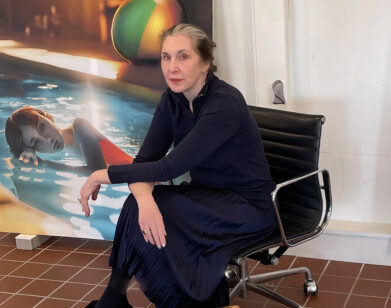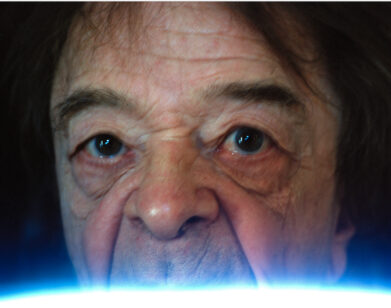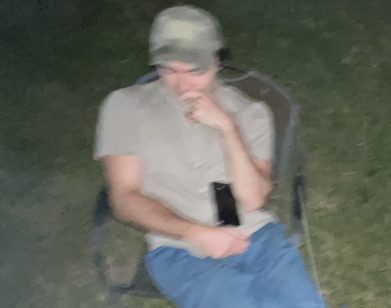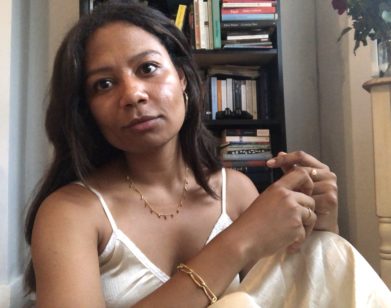LIT
Alexandra Tanner Wrote a Novel for the Terminally Online
Alexandra Tanner and I first knew each other on the internet. When we eventually met IRL through mutual friends, she told me that, once, she’d seen me walking on the street and whispered to her partner, fellow writer Sasha Fletcher, “That’s Becca Schuh, from the internet.” We went on to become much more than internet acquaintances, but the moment speaks to not only how much of our lives we live online, but the particular experience of being someone who is not only extremely online but incredibly self-aware about it.
Worry, her debut novel, out this week, has similar preoccupations. But instead of narrating the experience of being a Brooklyn writer who goes to the same bars and parties and park hangs as other Brooklyn writers, it describes the experience of someone whose relationship with both New York and the internet is almost entirely internalized. This makes for a relatable and ultimately chilling read: what happens to our brains when our inner monologue has little outer recourse?
Jules, the narrator, does have one human outlet for her thoughts, though it’s arguably just as fraught as having none at all: her sister, Poppy, who has arrived on the floor of Jules’ apartment after a covert suicide attempt. Their thoughts create an echo chamber of the highest order, arch and broken and erudite all at once. It is this interplay that provides the book its backbone; that, and complex relationships with animals, tenuous employment, nearly nonexistent social connections, and occasional missives from their affluent and out of touch parents. A few weeks before the book’s publication, the writer and her partner graciously hosted me to discuss age gaps (sibling version), 9/11, porn, 9/11 as porn, meme dialect, and the Goodreads users that have formed a coalition against one particularly nasty scene in her novel.
———
BECCA SCHUH: There are certain aspects of the book that I recognize from your life. Do you consider it to be autofiction?
ALEXANDRA TANNER: Good question.
SCHUH: Take your time.
TANNER: I was just talking to my sibling on the phone about this the other day. In a way, I think it’s autofiction, and I feel really close to it. But when you look at the finished novel, it’s almost completely invention. The weird, absurd scenes that happen when they’re out in the world, and so much of the internet stuff, is pulled directly from life. I don’t know if it’s formal autofiction.
SCHUH: But what is formal autofiction?
TANNER: Right.
SCHUH: There isn’t, as far as I know, a very concrete definition.
TANNER: I think when you start from a base of reality, [even] if the situation wanders and the exact parameters change, it still counts as autofiction.
SCHUH: This segues into my next question, which is, what do you think about autofiction in general, as a term, how people think about it, as it exists?
TANNER: I see a lot of people making noise about it and I don’t really know what to make of the noise. The first thing that comes to mind when I think of successful autofiction is Chelsea Hodson’s long Edouard Leve project.
SCHUH: Yeah, totally.
TANNER: I don’t know how much of that is fact. It’s a very formally structured project, but it feels so intimate. I think strict autofiction doesn’t exist because as soon as you put something on the page, you’re imbuing it with your impression. If I were to write about our night tonight, it’s from my point of view, it’s not fact.
SCHUH: That makes sense. If we’re taking autofiction as a term, what are the seminal texts? They’re probably different for a lot of people.
TANNER: I think so too.
SCHUH: Mine is How Should A Person Be?
TANNER: Mine too. That’s the first one that shakes you up.
SCHUH: We were like, 21 or something when that came out.
TANNER: We were babies. I think it was really formative for our micro-generation.
SCHUH: In Worry, Jules and Poppy are at two closely related but fundamentally different moments of adulthood. How did you portray the subtle differences in their life stages?
TANNER: No one has asked me this question so far, and I love it. They are at completely different stages. This is another thing I pulled from life—my sibling and I are three years apart, which doesn’t seem big, but it’s huge. And it feels huger when you’re smaller. But I think there’s something that happens in your mid-twenties, around that 25-year-old frontal cortex formation, where it again becomes a really big three years. Poppy even says it to Jules early on in the book, she has a long monologue where she’s like, “You have a job, you’re seeing someone, you have a life. And I don’t yet have a life. I have dreams of what I want my life to be, but I don’t have anything solid.” But Jules doesn’t have a solid life at all. She’s totally fucked up. She’s not in a stable relationship and she doesn’t have a fulfilling job or any kind of practice of self. But when you’re 24 and you look at someone who’s 28, it just seems like you’re on the other side of this chasm.
SCHUH: It came across really strongly to me, but I think it’s one of those things where it depends on your perspective. I have a younger sibling and she’s established in her own way, but I was noticing a lot of similar disparities. I think it’s quite specific to New York, in the sense of thinking that one person has it together and then, within the next few months, you’re like, “Oh, that person lost their boyfriend and their job.”
TANNER: It’s so New York-specific.
SCHUH: Which I obviously loved, as a person who lives here. You have a scene where Jules walks in on Poppy watching a video. Jules thinks it’s porn, but it’s 9/11 footage.
TANNER: I love watching 9/11 footage. You’re watching it to be horrified. I think sometimes you’re watching porn to be horrified, too. They are both pornography because they both elicit something that you can’t easily get from within yourself. They provoke an extreme feeling. You can go on YouTube or Pornhub or anywhere you want and watch either thing in 30 seconds.
SCHUH: Yeah. At one point, Jules says, “Poppy’s never been interested in the internet and the feelings it can offer.” You and I are both very “online,” as they say. How do you change your communication style when talking to people who are not online?
TANNER: I’m thinking of my parents. So many things are funnier when you can tie them back to something that’s a shared meme that everyone loves and that instantly makes you feel connected to other people who think it’s funny. It’s this beautiful shorthand. And that’s definitely why I’m on my phone so much, because I feel like it’s how I understand the social texture of the place where I live. You meet people online, you decide who you think is cool, who you want to dress like, who you want to publish in your magazine or whatever, by paying attention to who’s online with you. But if I lived in Oklahoma, I don’t think I would be that online. I wouldn’t care about it.
SCHUH: Jules being so online is a huge part of the book that I was interested in. I mean, books are a reflection of our time, but they’re also usually a couple of years behind. I feel like all the books I’ve read in the past couple of years, the ones that are attempting to be very modern, are like… “polyamory.”
TANNER: Yeah. When a book is like, “She opened her device and went to the website,” it’s always an attempt to veil actually saying, “She opened her computer and she went on Twitter and she liked this tweet about whatever.” I get why people don’t want to date their shit, but I think it’s just like improv. If you commit halfway, if you kind of think you have something funny to say but you don’t say it all the way, it’s not going to land. If you want to write about the texture of what it’s like to be on the internet, but you’re not writing about the actual physical, transcribed experience of being on the internet, you just can’t get into it as much.
SCHUH: I totally agree. My next question was going to be, “do memes matter?” But since I assume your answer will be yes, I’m extending it to, why do memes matter?
TANNER: I think they matter because, again, they bring you closer to the people you’re already close with and they give you a point of connection with people that you don’t know exist. You can all come together around a meme like a fire.
SCHUH: I love that. So, I enjoyed the riff in the book about how dead art is everywhere. Can you perhaps even riff a little more about dead art? Is art dead?
TANNER: I see that art is dead and I see that art is not dead. I think there are so many moments in life where it’s easy to feel art is dead, because there’s so much saturation of shit and advertising and bullshit everywhere, in every sphere of life. But when I read Bad Waitress [Schuh’s essay for Dirt], when I read something beautiful or encounter a beautiful movie, I feel that art isn’t dead. It’s alive and we’re all making it. But for Jules, in that passage in the book, I just wanted her to come down on something that I myself could not come down on.
SCHUH: When I read it, the impression I got was less that art, as a concept, is dead, and more that art that already exists has died. And what is it to be interacting with something that is dead?
TANNER: That fear that all the best shit is behind us. Anna Karenina has already been written. What’s the point?
SCHUH: Obviously, we’re entering a new Emily Gould era online. We love to see it.
TANNER: Thank god.
SCHUH: I remember when I was first reading her work when I was a baby, like 23, I was like, “I like this because it’s about being alive.” It’s not dead art. It’s alive art. And I think they both have their place. A lot of the time, I do want to be interacting with something alive. But of course, things that are dead are beautiful, and we’re also inspired by them. It’s like going to a museum versus going to… I would say a reading, but readings are kind of their own thing.
TANNER: Readings are dead.
SCHUH: Readings are dead in their own way.
TANNER: But we’re trying so hard to make them alive.
SCHUH: Readings are giving hospice. Readings are palliative care for the written word.
TANNER: Oh my god.
SCHUH: Speaking of dead things, you said that people on Goodreads have objected to the part of the book where an old acquaintance of the sisters fucks a dog to death. Obviously, it’s gross and fucked up, but I’ll never shy away from a book including a weird and gross thing. Can you talk about your reaction to the fucking a dog backlash?
TANNER: People fuck dogs to death.
SCHUH: It’s happened?
TANNER: It’s happened.
SCHUH: Like, multiple times?
TANNER: I will say that there is a specific incident of which I was made aware of a dog being fucked to death. And when I googled “dog fucked to death area that this happened,” there were so many results. A lot of people are doing this.
SCHUH: Wow.
TANNER: I love dogs. I don’t want harm to come to a dog.
SCHUH: Of course.
TANNER: But it happens. And you hear about it. I understand people don’t want to pick up a book and say, “I hope this book includes an anecdote about an animal losing their life in a horrific way.” But you can’t safeguard yourself from ever hearing about bad things happening in the world.
SCHUH: Moving along to a still-but-slightly-less disturbing topic, I know you’ve been in a relationship for a long time. But before that, did you really notice a trend on the apps of men with pictures at the Holocaust Memorial in Berlin?
TANNER: Yes.
SCHUH: Wow.
TANNER: At one point, I had an album. I regret that I no longer have the album, but it was these guys posing around the concrete slabs at the Holocaust Memorial.
SCHUH: Yeah, the concrete slabs. There’s a passage where Jules, perhaps ironically, is talking about piecing together something about America because of the mommies, et cetera. Do you feel like you’ve pieced together anything about America within the project?
TANNER: No. N-O. She resists definition.
SCHUH: The thing that has been provoking the most interesting thoughts about America recently is watching Love is Blind. I feel like it’s so American.
TANNER: It is. Love is Blind is classically an American story. The question isn’t even, “Why are we so obsessed with the physical?” It’s like, “Why are we creating these shows? Why do we want to watch people in situations?” I think that goes back to 9/11, and it goes back to how the American news cycle is presented to us. I’m getting fucking frustrated with people being like, “Another election coming up, gulp.” Who gives a fuck? It’s all rigged, it’s all murder, it’s all war.
SCHUH: Everything is really dark.
TANNER: There’s no goodness or morality anywhere. That’s what I have to say about America.
SCHUH: It’s not that I don’t care about politics. I’m just like, must we have the theater of discussing it?
TANNER: Exactly. It’s not that I don’t care. But it’s like, what is the point of caring when these are the systems? Thinking about the political texture of the last six or seven years, I do care so much less. The day after the big election when everyone walked around New York City crying—I think about how in The Grinch, when the Whos walking around when Christmas is stolen, everyone was so heartbroken. I can’t imagine ever summoning that amount of care in an American institution again.
SCHUH: During the early Trump administration, when I was a 27-year-old idiot, I was like “What if we actually have a nuclear war?” I got really upset about it because I was not yet on Prozac. One time I was talking about it at work and I was like, “What if there’s a terrorist attack on the Empire State Building?” And my co-worker looked at me and he was like, “Becca, I have something that will help you. When I have moments like this, I say, Carl, let’s think about you.”
TANNER: Instead of thinking about the terrorist attack.
SCHUH: Or the nuclear war, whatever.
TANNER: I think a cyber attack is coming.
SCHUH: Oh, for sure. I’m not a crazy prepper, but I do keep a lot of canned food in my house.
TANNER: You keep some stuff on hand.
SCHUH: Mostly canned food. I should probably keep more water, but I have seltzer. But mostly, if I don’t have any money, I just want to be able to eat a can of beans.
TANNER: Exactly. You’d make it two weeks into the nuclear winter.
SCHUH: I want to see if you can once again riff on the vibe that these three separate lines are putting off. The first is, “The part of my brain that loves hateful things is a glow.” The second is, “I love feeling better than the mommies, I love feeling better than anyone.” And this last one, near the end when they’re on the beach, is “Get off of him, says the man. Get off of him.” And he drags out the second him for many seconds. And it’s the worst thing I’ve ever heard.”
TANNER: The first two I get. The third one threw me for a loop.
SCHUH: There’s more of a commonality between the first two, but I think what is drawing them together is this reaction in the brain to certain kinds of stimuli. You express having this feeling to unnamed feelings.
TANNER: That was the project of the book.
SCHUH: Hell yeah.
TANNER: This is where I do have to talk about myself a little bit, but as an anxious person with intrusive thoughts and a really loud exterior voice in my head, the voice of anxiety, I thought it would be hard and fun and revealing to create a character who was enough like me that I could capture it. I was paying attention to how it would feel to look at the Instagram of someone you hate, and what it sounds like when you hear the worst thing you’ve ever heard and realize, “Oh my god, that’s the worst thing I’ve ever heard.” That was the project of Jules: listening to my inner voice, and writing it down, and then letting it inform her.
SCHUH: At one point I realized that I had underlined a passage in the book that was referencing things that one might try to do to be a more functional person. How often do you think about those moments of wanting to make things better via self-improvement? And do you ever actually find yourself embedding new habits?
TANNER: Hardly ever, and if I do, for a very brief period. I famously got into Pilates a year-and-a-half ago. I was like, “This is giving me strength and energy and purpose and I have somewhere to be every Friday at 9:00.” And I couldn’t keep it going, because other areas of my life required more attention. It’s hard to change your life. At a certain point, you realize your life is only going to change through significant, sustained consistency, and that’s really hard.
SCHUH: It’s depressing. So, reading the book, I’m seeing genealogy. “Baby” is a friend you made for yourself. “Mother” is creating an idealized child and spinning out when the child doesn’t fulfill. All anyone wants is to be mothered. What of all that?
TANNER: Yeah, you said it. If there was a SparkNotes guide to this book, motherhood would be a huge theme. Our mothers are the biggest characters in our lives for a lot of people. Sisters have a relationship that is in many ways predicated on gender, both being female. I think the mommies sort of emotionally reflect Jules hanging onto the part of her identity that is a child, the part that does need to be mothered. The mommy bloggers use their children for content or see their children as highly gendered, almost like adults at a young age. So many mommy bloggers let their little girls wear eye shadow and press-on nails when they’re like, eight or nine years old. That’s fine. I don’t care. I wore eye shadow and press-on nails sometimes when I was eight years old. But there’s just something about the adultification of the child, and the child-ification of the adult. It’s very hard to take millennial parents seriously. It’s all connected, this concept of caretaking and projecting and how you’re presenting yourself to the world.
SCHUH: Taking it a step further, it’s like we’re in this moment of mother-daddy as cultural signifiers.
TANNER: We are. Holy shit.
SCHUH: And they’re beyond sexual. For a while, they were only sexual, but now I hear everything.
TANNER: This is why you’re the smartest person I know, because everyone is calling everyone “mother” and “daddy,”
SCHUH: And not just in bed. It’s everywhere.
TANNER: It’s everywhere.
SCHUH: What does that mean? I don’t actually want Taylor Swift to be my mother.
TANNER: She would not be a good mother. She’s about to be a mother. In three years, I know it.
SCHUH: You’re so right. You’re really good at predictions.
TANNER: Marriage, baby, Nashville move. She’s going to open a luxury goods store.
SCHUH: She’s going to Kelly Clarkson the shit out of a luxury goods line. And I like Kelly. I have respect for her.
TANNER: I have mad respect for Kelly Clarkson. She raised me. She’s Mother.
SCHUH: We should definitely have a Taylor Swift round table with the girlies.
SCHUH: I would love that. She’s at this point where people, even if they’re pretending to be critical, are really still glomming.
TANNER: They’re glomming. They’re feeding.
SCHUH: They’re sucking at the teat, for sure.
TANNER: They’re sucking at the teat of Miss Americana. Aren’t we all?






